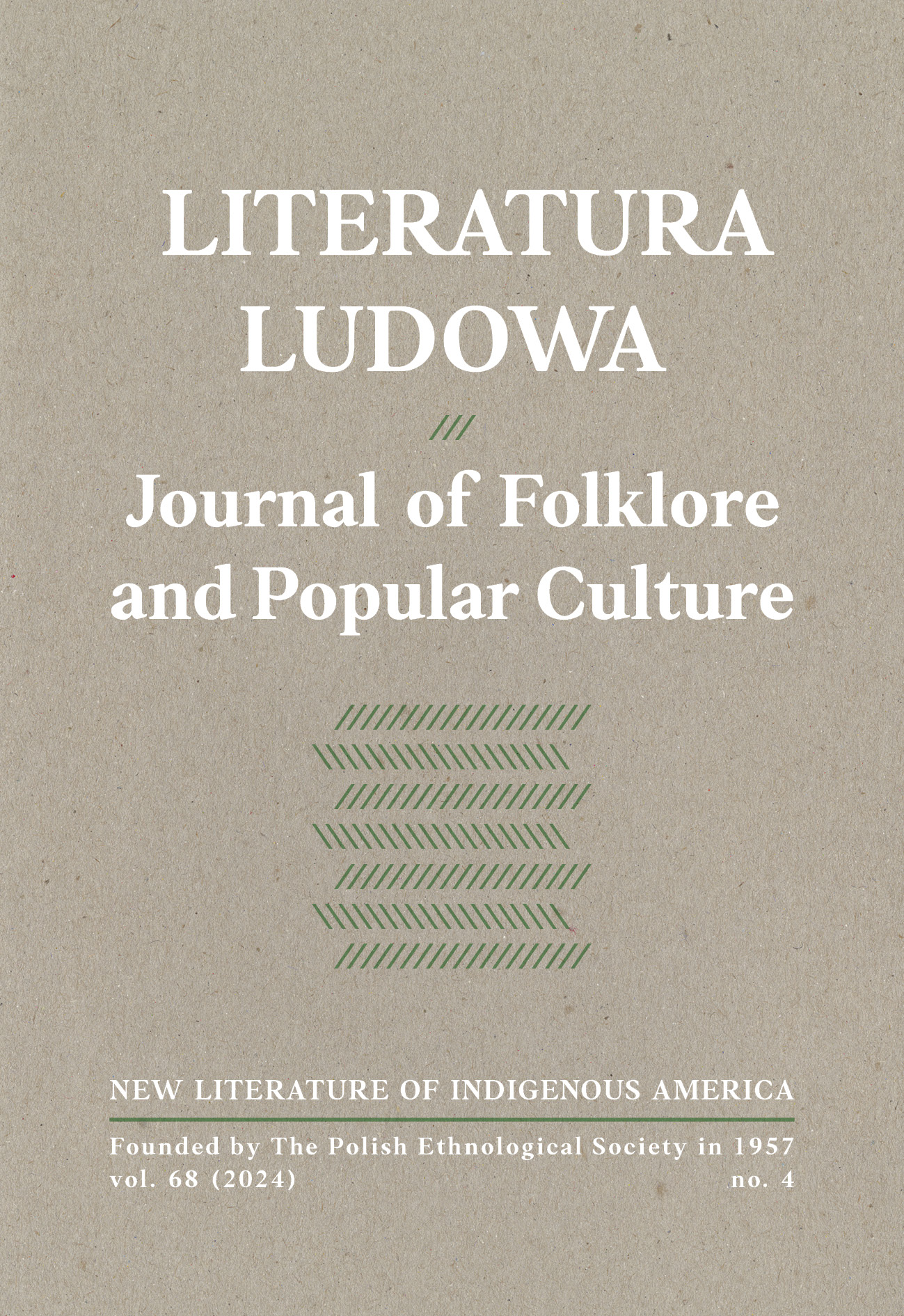Elegies on Lost Daughters – Individual and Cultural Trauma in Louise Erdrich’s The Painted Drum and David Treuer’s Prudence
DOI:
https://doi.org/10.12775/LL.4.2024.004Keywords
indigenous history, contemporary Ojibwe fiction, feminism, masculine tradition, memory studiesAbstract
In my article I compare two contemporary Ojibwe novels about death. Louise Erdrich’s The Painted Drum and David Treuer’s Prudence are elegiac stories about different ways of experiencing mourning in individual and collective context, filtered through the Western and Indigenous traditions. In both narratives the authors trace historical motives that give the readers access to Indigenous perspectives in the mainstream American history and I would like to argue that the discussed novelists focus on different strategies of including Indigenous history. I would like to argue that despite the contrast in the literary convention, i.e., Erdrich’s use of magical realism and Treuer’s social realism, there are many similarities between the narratives, as they both refer to mourning after the loss of daughters (biological and adopted), and in both cases the process is accompanied by self-destruction, memory and denial. What is more, even though Erdrich showcases feminist perspective and Treuer focuses more on masculine tradition, neither of them promotes a radical gender perspective. Another common denominator is a polyphonic structure, which helps to emphasize the clashes in the characters’ attitudes towards the Indigenous tradition, in the assimilation to the American culture and the deconstruction of pop cultural stereotypes about “stoic Indian men” and “promiscuous Indian women” and, last but not least, the relationship with nature, which is not always considered an animistic living space. My interpretation will extend to the broader context of Ojibwe presence in Minneapolis by a short analysis of museum exhibitions and public places of commemoration and I will try to demonstrate how Erdrich’s and Treuer’s propositions relate to it. In my paper I will use the terms “Ojibwe” when specific references are made by the authors to this particular culture and “Indigenous” when a broader context is indicated, e.g. boarding schools’ history that goes beyond the Ojibwe experience. I will also try to explain why Treuer uses the term “Indian”.
References
Carnes, J. M. (2015). Prudence: A Novel by David Treuer. Studies in American Indian Literatures, 27, 109–112.
Chavkin, A. (1999). The Chippewa Landscape of Louise Erdrich. The University of Alabama Press.
Clifford, J. (2013). Returns. Becoming Indigenous in Twenty-First Century. Harvard University Press.
Erdrich, L. (2005). The Painted Drum. HarperCollins Publishers.
Erdrich, L. (2016). The Antelope Woman. Harper Perennial.
Erdrich, L. (2021). The Sentence. HarperCollins Publishers.
Jacobs, C. A. (2001). The Novels of Louise Erdrich. Stories of Her People. Peter Lang Publishing.
Kirwan, P. (2009). Language and Signs: An Interview with Ojibwe Novelist David Treuer Author(s): Ojibwe Novelist. Journal of American Studies, 43(1), 71–88.
Kennedy, V. (2008). A Conversation with David Treuer. Studies in American Indian Literatures, 20(2), 47–63.
Knopf, K. (2008). Decolonizing the Lens of Power. Indigenous Film in North America. Rodopi.
Krupat, A. (1992). Ethnocriticism: Ethnography, History, Literature. University of California Press.
Krupat, A. (2009). Culturalism and Its Discontents: David Treuer’s Native American Fiction: A User’s Manual. The American Indian Quarterly, 33(1), 131–160.
Lincoln, K. (1993). Indi’n Humor: Bicultural Play in Native America. Oxford University Press.
Owens, L. (1994). Other Destinies, Other Plots. Understanding the American Indian Novel. University of Oklahoma Press.
Porter, J. (2005). Historical and cultural contexts to Native American literature. In J. Porter, M. Kenneth (eds), Cambridge Companion to Native American Literature (pp. 39–68). Cambridge University Press.
Rainwater, C. (1990). Reading Between Worlds: Narrativity in the Fiction of Louise Erdrich. American Literature, 62(3), 405–422.
Shaftel, D. (2015, 20 March). “Prudence”, by David Treuer. Financial Times. https://www.ft.com/content/2ca2ccdc-ad49-11e4-a5c1-00144feab7de
Szczepański, J. (1973). Odmiany czasu teraźniejszego. Książka i Wiedza.
Szlagowska-Papuzińska, A. (2023). Macierzyństwo i zdrowie kobiety w środowisku wiejskim okresu powojennego. Medycyna Nowożytna, 29 (suplement), 253–276. https://doi.org/10.4467/12311960MN.23.030.18754
Taylor, Ch. (2010). Nationalism and the Cross-Cultural Dilemma. Studies in American Indian Literatures, 22(3), 26–44.
Treuer, D. (1999). The Hiawatha. Picador.
Treuer, D. (1995). Little. Picador.
Treuer, D. (2006). Native American Fiction. A User’s Manual. Graywolf Press.
Treuer, D. (2012). Rez Life: an Indian’s Journey Through Reservation Life. Grove Press.
Treuer, D. (2015). Prudence. Riverhead Books.
Treuer, D. (2019). The Heartbeat of Wounded Knee. From 1870 to the Present. Riverheads Books.
Tryfan, B. (1967). Wolny czas kobiet wiejskich. Wieś Współczesna, 9, 39–49.
Tryfan, B. (red.) (1975). Czyste wody moich uczuć. Książka i Wiedza.
Tuhiwai-Smith, L. (2012). Decolonizng Methodology. Research and Indigenous Peoples. University of Otago Press.
Weaver, J., Womack, C. S., Warrior, R. (2006). American Indian Nationalism. University of New Mexico Press.
Downloads
Published
How to Cite
Issue
Section
License
Copyright (c) 2025 Agnieszka Gondor-Wiercioch

This work is licensed under a Creative Commons Attribution-NoDerivatives 4.0 International License.
1. The authors give the publisher (Polish Ethnological Society) non-exclusive license to use the work in the following fields:a) recording of a Work / subject of a related copyright;
b) reproduction (multiplication) Work / subject of a related copyright in print and digital technique (ebook, audiobook);
c) marketing of units of reproduced Work / subject of a related copyright;
d) introduction of Work / object of related copyright to computer memory;
e) dissemination of the work in an electronic version in the formula of open access under the Creative Commons license (CC BY - ND 3.0).
2. The authors give the publisher the license free of charge.
3. The use of the work by publisher in the above mentioned aspects is not limited in time, quantitatively nor territorially.
Stats
Number of views and downloads: 293
Number of citations: 0



